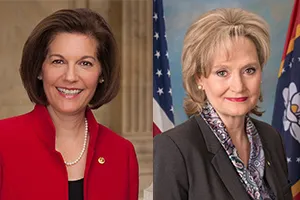 Two US senators, Catherine Cortez Masto (Nevada) and Cindy Hyde-Smith (Mississippi) yesterday filed the Withdrawing Arduous Gaming Excise Rates (WAGER) Act. This bipartisan legislation would repeal the federal excise tax levied on legalized gambling operators.
Two US senators, Catherine Cortez Masto (Nevada) and Cindy Hyde-Smith (Mississippi) yesterday filed the Withdrawing Arduous Gaming Excise Rates (WAGER) Act. This bipartisan legislation would repeal the federal excise tax levied on legalized gambling operators.
More specifically, the bill aims to eliminate the “handle” tax of 0.25% on all bets and the annual $50 “head” tax per employee, thus helping states “reinvest their gaming revenues into their local economies”. The legislative change would “boost local sports tourism and gaming economy.”
Both senators commented on the motifs that inspired them to introduce the proposal. In a press release, Senator Cortez Masto mentioned Nevada’s multiple top-level sports teams and the community’s awareness of the importance of legal betting’s contribution to the state budget. She affirmed that the legislation would ensure tax relief to consumers and gambling operators, opening up opportunities for more jobs and keeping the tax revenue in the state.
Likewise, Senator Hyde-Smith highlighted Mississippi’s robust tourism industry and the contribution of local casinos and resorts to it. She effectively summarized the WAGER Act’s ultimate goal: “By repealing this tax, our bipartisan WAGER Act will level the playing field, boost local economies, and ensure that gaming revenues stay here, supporting jobs and community investments.”
Representatives Dina Titus and Guy Reschenthaler introduced similar legislation in the US House of Representatives in 2023.
AGA Responds to the WAGER Act
 Bill Miller, President and CEO of the American Gaming Association (AGA), immediately shared his unequivocal support for the proposed legislation. Enacted in 1951, the federal excise “handle” tax of 0.25% on all legal bets and the $50 annual “head” tax per employee aimed to suppress illegal operators.
Bill Miller, President and CEO of the American Gaming Association (AGA), immediately shared his unequivocal support for the proposed legislation. Enacted in 1951, the federal excise “handle” tax of 0.25% on all legal bets and the $50 annual “head” tax per employee aimed to suppress illegal operators.
At that point in time, Nevada was the sole state that offered gambling. Considering today’s US betting and gaming landscape, with 38 states and Washington D. C. having authorized some form of gambling, this outdated legislation “punishes legal operations while incentivizing illegal sports books.”
The AGA’s CEO further explained that the playing field was not level, as illegitimate operators did not pay federal and state taxes, have responsible gambling tools, or offer underage gambling verification. All these aspects allowed them to save on operating expenses and offer more competitive odds, ultimately placing legal companies in an unfavorable position.
While exempting operators from this tax, the WAGER Act maintains legislation to suppress illegal operations. Bill Miller also expressed the association’s gratitude to both senators and its determination to cooperate with policymakers to enact “legislation to address this harmful tax.”
Similarly, sports betting operators backed the repeal of the tax, stating that it would provide favorable conditions for a competitive market and direct consumers to legal venues for gambling and betting.